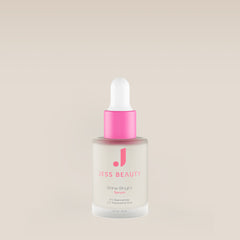Retinol has gained popularity in the skincare world due to its many benefits and ability to improve the appearance and health of the skin. Known for its powerful anti-aging action, retinol is a form of vitamin A widely used in cosmetic products.
In this article by Jess Beauty, we'll explore the top five ways retinol can improve skin, addressing its benefits to fight wrinkles, improve texture, reduce hyperpigmentation, treat acne, and stimulate cell renewal.
I. Reduction of wrinkles and fine lines:

Its effectiveness is based on the stimulation of the production of collagen and elastin, key proteins to maintain the firmness and elasticity of the skin.
Collagen is a structural protein in the skin that gives it strength and support. As we age, collagen production slows, leading to wrinkling and loss of skin firmness. Retinol stimulates collagen production by activating the genes responsible for its synthesis.
By increasing the amount of collagen in the skin, retinol helps to strengthen the skin and reduce the appearance of wrinkles, making the skin appear firmer and smoother.
Elastin, on the other hand, is an elastic protein that provides skin the ability to stretch and recover. As we age, elastin breaks down, leading to less elasticity and the formation of fine lines.
Retinol stimulates elastin production, which helps improve skin elasticity and reduce the appearance of fine lines.
II. Skin texture improvement:
Retinol acts as a gentle exfoliant by penetrating the upper layers of the skin and dissolving the bonds between dead cells. It helps to effectively remove dead cells accumulated on the skin's surface, improving its dull and rough appearance.
By removing dead cells and promoting cell renewal, retinol smooths skin's texture. Blemishes and roughness are minimized, while the skin becomes more even and soft. In addition, by promoting collagen and elastin production, retinol helps improve the firmness and elasticity of the skin, which contributes to its rejuvenated appearance.
III. Reduction of hyperpigmentation and dark spots:
Retinol works by inhibiting the enzyme tyrosinase, which plays a crucial role in the production of melanin, the pigment responsible for skin color. By reducing tyrosinase activity, retinol decreases excessive melanin production, helping to prevent the formation of dark spots and discoloration.
In addition, retinol contributes to gradually diminishing the appearance of existing dark spots and discoloration on the skin. As the skin is renewed and the superficial layers are shed, the dark spots tend to become less visible, and a more even skin tone is achieved.
IV. Treatment of acne and blemishes:

Retinol is widely used in acne treatment and skin blemishes due to its antibacterial and anti-inflammatory properties.
Antibacterial Properties:
Retinol has antibacterial properties that help fight acne-causing bacteria such as Propionibacterium acnes. By reducing the presence of these bacteria, inflammation and the spread of acne lesions are minimized.
Anti-Inflammatory Properties:
Retinol also has anti-inflammatory properties, which means it helps reduce inflammation and redness associated with acne. It helps soothe irritated skin and promotes faster healing.
Unclogging clogged pores:
Acne forms when skin pores become clogged with sebum, dead cells, and bacteria. Retinol helps unclog clogged pores by promoting the gentle exfoliation of dead cells and stimulating cell renewal. By unclogging the pores the formation of comedones and the appearance of acne breakouts are reduced.
Regulation of sebum production:
Retinol regulates sebum production, the oily substance produced by the sebaceous glands in the skin. Excess sebum can clog pores and contribute to the development of acne breakouts.
By regulating sebum production, retinol helps keep pores clear and prevent the formation of new acne lesions.
V. Stimulation of cell renewal:

Retinol is known for speeding up the skin's cell renewal process, resulting in many benefits for a radiant, fresh, and rejuvenated appearance.
It works on the deeper layers of the skin, stimulating cell renewal and accelerating the rate at which cells are shed and replaced by new cells. It means dead cells are removed more efficiently, allowing new, healthy cells to reach the skin's surface more quickly. As a result, the skin looks fresher and more rejuvenated.
How and when to use retinol?
The use of retinol and the frequency of application may vary depending on the product and your skin sensitivity. However, here are some general guidelines you can follow when using it:
- Gradual introduction: If this is your first time using retinol, start with a low concentration and use it less frequently to allow your skin to get used to it. Start with products that contain a retinol concentration of 0.1% or less and use them only once a week for the first few weeks. Then, you can gradually increase the frequency of use according to your skin tolerance.
- Cleanse and dry: Before applying the retinol, make sure to cleanse and dry your skin completely. It helps the retinol to absorb more effectively.
- Evening application: Retinol is most effective when applied at night, as it can be photosensitive and may become unstable under sun exposure. Also, applying it overnight allows it to work on the skin while you rest.
- Appropriate amount: Use a small amount of product to cover the entire face. A small drop is usually enough. Avoid applying an excessive amount, as this will not improve results and may increase irritation.
- Additional hydration: After applying the retinol, you can use a moisturizer to help reduce any possible dryness or irritation associated with its use.
- Sun protection: Retinol can make skin more sensitive to sunlight, so you should use sunscreen during the day, to protect your skin from harmful sun rays.
Remember that the sensitivity of each person can vary, so it is important to listen to your skin. Also, remember that you must give your skin the best, so choose products from brands that follow the highest quality standards.
Visit the Jess Beauty catalog and discover the products that will revolutionize your skincare routine.








